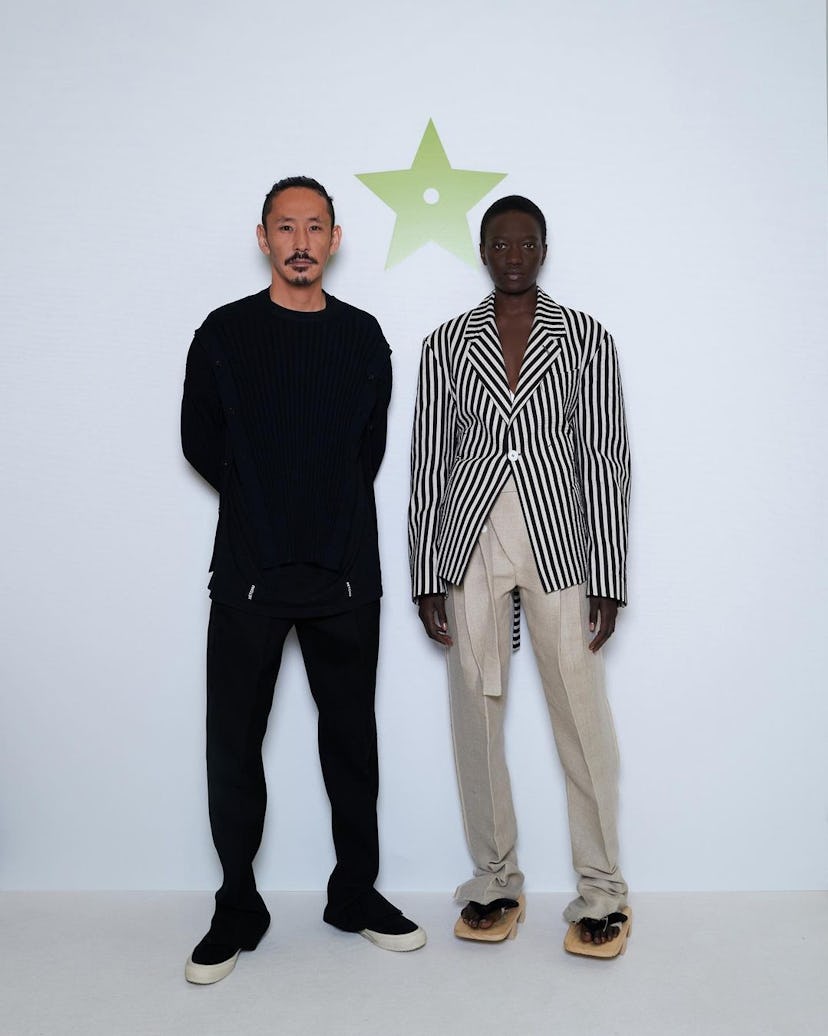Setchu Designer Satoshi Kuwata Wins the Prestigious 2023 LVMH Prize

“Of course it's a good feeling, but I'm really happy for the people who support me,” designer Satoshi Kuwata told W earlier this year after being nominated for the 2023 LVMH Prize for Young Designers. Now he has more to celebrate. This morning his Milan-based label Setchu was awarded the 10th annual iterations of the prestigious award. The distinction places him among past honorees including Nensi Dojaka, Marine Serre, and last year’s awardee, S.S. Daley. Kuwata beat out 2,400 applicants from 15 countries in order to win the award and was chosen by a panel of judges, which included fashion industry luminaries like Marc Jacobs, Jonathan Anderson, Mel Ottenberg, and Karlie Kloss. In addition to the money, Kuwata will also get a year-long mentorship provided by LVMH.
Born and raised in Japan, Kuwata left home at 21 for London, later spending time in other major fashion capitals including New York, Paris, and his current home of Milan. It’s his experiences in these many cities that shape his work at Setchu, a brand with an “east meets west” ethos at its core. The name itself speaks to that, coming from the Japanese phrase, “wayo setchu,” with “wayo” meaning West and “setchu” meaning compromise. “I don’t design kimono, I design Western clothes, but there’s going to be a Japanese feeling in there because I’m Japanese,” he said. “Otherwise, what’s the point?”
As of now, Setchu is basically a one-man operation, but the designer leans on the support of those around him, often accepting help while unable to guarantee compensation in return. Now, with the €400,000 that comes with the award, Kuwata plans to acquire some office space (he currently works out of his house), and to add one or two trusted people to the opperation to handle the administrative side of the brand. His ultimate goal is for Setchu to become a heritage company, something that outlives even him.
“I want this company to be one of the maisons in [LVMH],” he said in a press conference following his win. He plans to take advantage of his mentorship to help Setchu reach that goal. “It's not just about design, but the business side of it. What do I need to be a Loro Piana in 30 years time? LVMH is good at making heritage. They are the heritage and I really want the heritage.”
In addition to Setchu, LVMH also awarded Bettter by Ukrainian designer Julie Pelipas and Magliano by Italian designer Luca Magliano with the Karl Lagerfeld Prize. They will both receive €200,000 as well as their own year-long mentorships. “It’s a beautiful feeling to be seen,” said Magliano as he accepted the award.
Founded in 2017, Magliano has emerged as a classic menswear brand, albeit one with a twist. Exploring class struggles and the concept of luxury through tailoring, the designer has amassed a fan base thanks to his unique point of view and the help of Milanese holding company and fashion business accelerator Underscore District, which recently bought a minority stake in the brand. Still, Magliano, like Setchu, remains small, and the designer hopes to invest his winnings into building out his team.
“What I want to do as soon as possible is hire people, to make the structure stronger,” he said. “At this point, we are three people working on the brand, which is becoming quite big...we are in a good moment in our maturity, I would say, so we need people.”
For Pelipas of Bettter, the award is not only a recognition of her brand, but of the need for sustainability in the fashion industry. Bettter is committed to sourcing their material from secondary markets, and the brand has already brought new life to over 7,000 pieces of clothing that already existed, reissuing old jackets, sweaters, and even sneakers in their collections. “The fact that this prize was given to Bettter means the industry is ready for this technology,” Pelipas said. “I hope that it will echo in all other levels of fashion, not only production, but also perception of products, how we buy, how we promote, how we communicate about fashion itself. I really believe it’s a significant approval of the sustainable direction fashion now takes.”
For now, though, the winners are all focused on getting some much-needed rest after a whirlwind few days. They are also ready to celebrate their respective accomplishments. “I’ll get drunk, probably,” Magliano said of his plans for the evening. “I will relax a bit, finally, though not that much, because in a week we have a show in Milan.” Kuwata, too, has similar plans, preceded only by a few phone calls. He already told his mother the news, now he has a few more people to inform, and then? “Maybe get drunk.”